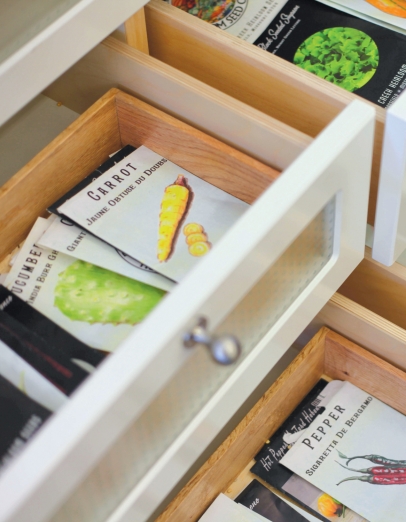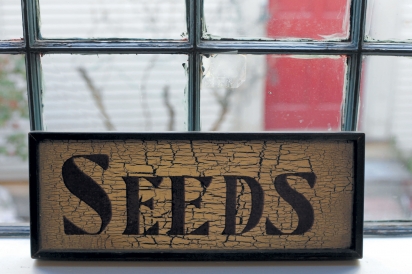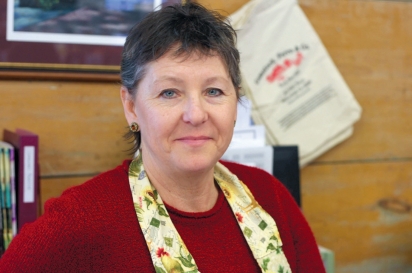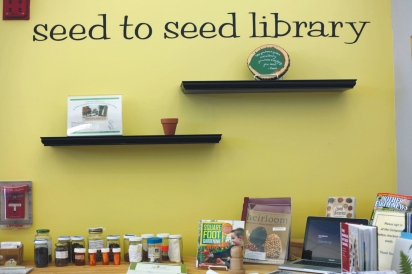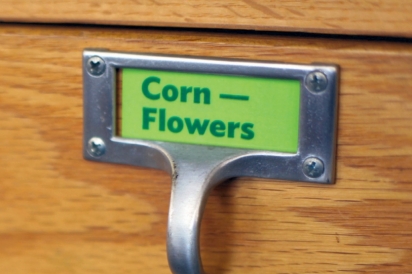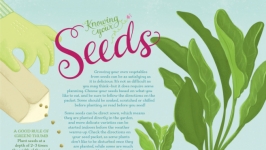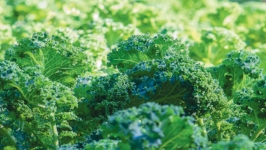Gone to Seed: Exploring Connecticut's Seed Libraries
Tucked into corners of libraries throughout Connecticut, cabinets and drawers are filled with the future: seeds. Not only are they the perfect foil for winter’s slumber, but they may well be the future of our libraries, our communities, our food, and our planet.
Seeds have become a serious matter. The 2009 documentary film Food, Inc., which explores America’s increasingly industrialized food system, examines, in part, the effects of mega-agricultural company, Monsanto, creating then patenting an herbicide-resistant soybean seed. Farmers who bought those seeds were unable to legally save them for their following year’s crop, an ongoing practice of farmers for about 12,000 years. Since Monsanto held the patent on them, they sued for patent infringement and breach of contract any farmers who did save seeds, and Monsanto won. To understand the scope of such seed skirmishes and the benefits of using your local seed library, it’s important first to understand the breeding methods of seeds.
THE SPECTRUM OF SEEDS
According to Seed Savers Exchange, a nonprofit whose mission is dedicated to sharing and saving seeds, there are basically four kinds of seeds: open- pollinated, heirloom, hybrid, and genetically-engineered (GE). Open-pollination occurs by wind, bird, humans, insects, or other natural means and will generally produce the same genetic seed type. Heirloom seeds are open-pollinated seeds with a generational history (as the name suggests) that usually have been handed down for at least 50 years. Hybrid seeds are produced through controlled pol- lination. Ellyn Mavalwalla, Master Gardener for the Heirloom Market at Comstock Ferre in Wethersfield, says, “Hybrids are created to produce a specific combination of traits, for example, disease resistance combined with flavor, etc.”
Finally, there are GE seeds. While farmers have tinkered with the makeup of plants for centuries, they’ve done so via hybridization. GE seeds (some call these “genetically modified organisms,” or GMO’s) are crafted at a molecular level, where the DNA of one organism is combined mechanically (in a laboratory) with the DNA of another organism. Monsanto’s GE soybean seeds, for example, were pro- duced to resist glyphosate, the active herbicide in Roundup. The safety of GE seeds are being debated, but fears generally swirl around the fact that they are produced without regard to natural principles and could have unexpected and harmful health effects, unpredictable environmental effects, and that they may be more susceptible to pests and disease. Groups like the Non-GMO Project say GE seeds don’t increase yields, resist drought, or provide enhanced nutrition, despite industry’s claims to the contrary.
Although many farmers rely on yearly purchased seeds, they also save open-pollinated seeds for various reasons. They collect seeds that have usually already adapted to regional conditions. Thus, these seeds are reliable producers for local agriculture. Additionally, open-pollinated seeds adjust and adapt to shifting weather patterns, which helps create a natural biodiversity among plants, according to SeedWorld magazine. Of course, flavor (per an informal consensus among friends) is another important reason that farmers save open-pollinated seeds rather than hybrid seeds. Mavalwalla concurs: “Planting seeds saved from a hybrid plant will get you some formation of the parent plants, but not what you are expecting, and usually unpalatable.” Finally, saving seeds is an inexpensive way to build a seed supply. What happens, as Food, Inc. suggests, if the majority of seeds become “owned” or patented? Will home gardeners eventually be subject to patent laws or have to rely on GE seeds rather than harvesting them from their own prize tomato plants?
While this may seem dramatic, farmers and backyard gardeners are not the only people thinking, talking, and taking action around seeds. The Svalbard Global Seed Vault, built for $9 million into a mountainside on a remote island and about 810 miles from the North Pole, can store, at its peak, 2.5 billion non-GE seeds. Its mission? “To ensure the conservation and availability of crop diversity for food security world- wide.” With the global population expected to exceed 11 billion by 2100, we are going to need seeds with known results and in a sizeable variety. And we are going to need a lot of them.
CONNECTICUT’S SEED LIBRARIES
Connecticut’s seed libraries don’t have a giant, impermeable vault, but they are making small but important efforts on behalf of our planet and on behalf of local agriculture. Teresa Roxburgh, Director of the Minor Memorial Library in Roxbury, feels it’s a good fit. “One major aspect of our library’s mission is to serve the needs of our community. Roxbury has a tradition of farming and gardening, and our hope is that our seed library will encourage small-scale, sustainable farming and gardening of plants that are native to Connecticut or that thrive in our climate.” Lawrence Davis-Hollander, founder and former director of the Eastern Native Seed Conservancy, generally agrees. “Ideally, you want to create a living seed bank, where you plant something – preferably something rarer than Lacinato kale – every two years, so it can adapt to new, local environmental conditions.” After a seed has undergone this process of local adaptation, Davis-Hollander considers it “grown out.” He says he was given an extinct watermelon seed from Russia’s seed bank. However, it would not germinate because it wasn’t grown out. He insists that growing out a seed is critical to its propagation, but also, doing it on a small scale can reap huge benefits. “If a small library chooses 12 or more rare seeds to help propagate, then they could at least help save those 12 plants.” True to this idea, Davis-Hollander is helping The Scoville Library in Salisbury launch a seed library this spring.
Not only is the concept of a seed library good for the planet and our communities, it is helping to reinvigorate the whole concept of the library. “Libraries are so much more than about books,” says Mary Coe, Fairfield Branch Reference Librarian. Indeed, with the rise of digital communications and e-books, libraries are extending services to meet community needs that go beyond the latest novel. Fairfield’s seed library has inspired other programs too; they’ve held tomato tastings, gardening classes, lectures, and Erik Frisk, who launched their seed library, tends to their nearby community garden. They’ve also had tremendous support from other community groups like the Fairfield Earth Day Committee and the Fairfield Green Food Guide, to name a few. “Our goal is to have every household in Fairfield plant a garden,” Coe says.
Nancy Coriaty, Fairfield Public Library’s Deputy Town Librarian says that, in 2010, they noticed more and more people checking out their expanding gardening book collection. “We also began showing movies based on sustainability, like King Korn and The Real Dirt on Farmer John, and 60 and 70 people showed up for these films.” They began to talk to their constituents and found that people were becoming more and more interested in sustainable living and gardening. “We applied for a grant with the Fairfield Organic Teaching Farm through the New England Grassroots Environment Fund and began our seed library with that funding,” she says.
New Canaan Reference Librarian, Alexa Roy, says they started a seed library for multiple reasons. “Our community has a lot of gardeners and a garden club that has been active since the early 1900s. We saw how our farmers market (across the street from the library) drew people in, alongside the fact that, now, people also want to grow their own non-GMO food, food that is cleaner and tastier. Plus, having a seed library also makes the genetic seed pool more diverse.” Not to mention, borrowing a seed from a neighbor who successfully planted and harvested troughs of delicious chard is simply a smart thing to do; if it works in their backyard, chances are it will work in yours.
But how do you borrow such an ephemeral thing as a seed? It’s as easy as borrowing a book. You visit your library or seed exchange, borrow seeds, plant a garden, then harvest some seeds after the plant is done producing. You return these seeds to the library. When saving seeds, be sure to save only heirloom or open-pollinated seeds, store them in a cool dry place, and label them with as much detail as you can. Saving heirlooms is a bit trickier because you don’t want to cross pollinate them with another plant. There are books on this subject, and thankfully, a library can help in that respect, too!
Inspired? If you have any saved open-pollinated or heirloom seeds, bring them to one of these libraries. Confused? Talk to your local seed library or visit their websites for more information on how to save seeds. Or talk to Ellyn Mavalwalla, whose company often donates last year’s seeds to interested parties to jump start their programs.
Seed libraries can help ensure plant sustainability, plant diversity and well-being, and quite possibly human health. They are a perfect vehicle for educating people on agriculture and food sources as they cultivate and connect community, and hopefully, make a difference in the process.
> Bethlehem Public Library: 32 Main St. South, Bethlehem; 203-266-7792
> Comstock Ferre & Co. and Heirloom Market: 263 Main St., Wethersfield; 860-257-2790
> Fairfield Public Library: 1147 Fairfield Woods Rd., Fairfield; 203-255-7307
> Minor Memorial Library: 23 South St., Roxbury; 860-350-2181
> New Canaan Seed Library & Exchange: 151 Main St., New Canaan; 203-594-5000
> Scoville Memorial Library: 38 Main Street, Salisbury; 860-435-2838
> Westport Public Library: 20 Jesup Rd., Westport; 203-291-4800


